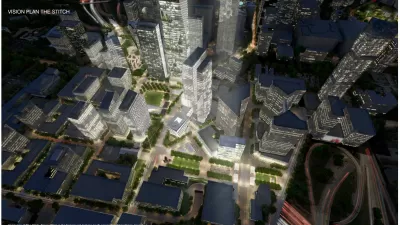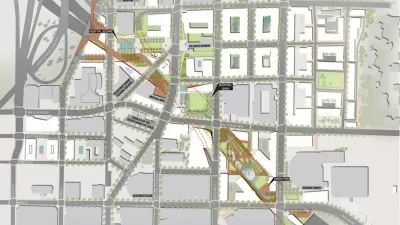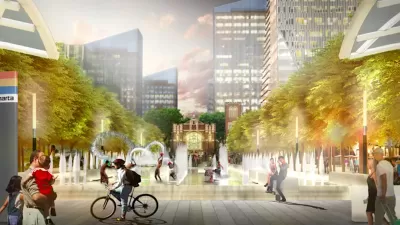Other cities have taken notice of the smashing success of Klyde Warren Park in Dallas, Texas. Atlanta now wants a downtown cap park of its own.
Scott Henry reports on the proposal for "the Stitch," a plan "to cap the Downtown Connector by building concrete decking over the top of I-75/85 from the Spring Street flyover southeast to the Piedmont Avenue bridge."
The proposal is the work of Central Atlanta Progress (CAP), a nonprofit devoted to promoting economic development downtown, and an alliance of neighborhood boosters and downtown landowners. So far CAP has spent "close to $100,000 to commission the 114-page study from the Atlanta office of Jacobs, a global engineering company based in Pasadena" and is currently seeking another $1 million for preliminary engineering work. In total, the project is expected to cost about $300 million—a figure calculated based on the cost of Klyde Warren Park in Dallas.
If built, the Stitch will also owe a spiritual debt to Klyde Warren Park.
Although the name is new, the idea behind the Stitch has been around for years, appearing in previous planning documents and maps published by CAP. But the striking success of Klyde Warren Park has helped spur interest in highway-capping projects in cities around the country.
The hope for the Stitch is for it to it "bring about a fresh renaissance in Atlanta’s urban core and finally erase the half-century-old barrier between downtown and Midtown," according to Henry. The article includes lots of renderings of the conceptual plan for the cap park.
FULL STORY: The Stitch: An ambitious proposal to build parks and housing above The Connector

Alabama: Trump Terminates Settlements for Black Communities Harmed By Raw Sewage
Trump deemed the landmark civil rights agreement “illegal DEI and environmental justice policy.”

Planetizen Federal Action Tracker
A weekly monitor of how Trump’s orders and actions are impacting planners and planning in America.

The 120 Year Old Tiny Home Villages That Sheltered San Francisco’s Earthquake Refugees
More than a century ago, San Francisco mobilized to house thousands of residents displaced by the 1906 earthquake. Could their strategy offer a model for the present?

In Both Crashes and Crime, Public Transportation is Far Safer than Driving
Contrary to popular assumptions, public transportation has far lower crash and crime rates than automobile travel. For safer communities, improve and encourage transit travel.

Report: Zoning Reforms Should Complement Nashville’s Ambitious Transit Plan
Without reform, restrictive zoning codes will limit the impact of the city’s planned transit expansion and could exclude some of the residents who depend on transit the most.

Judge Orders Release of Frozen IRA, IIJA Funding
The decision is a victory for environmental groups who charged that freezing funds for critical infrastructure and disaster response programs caused “real and irreparable harm” to communities.
Urban Design for Planners 1: Software Tools
This six-course series explores essential urban design concepts using open source software and equips planners with the tools they need to participate fully in the urban design process.
Planning for Universal Design
Learn the tools for implementing Universal Design in planning regulations.
Clanton & Associates, Inc.
Jessamine County Fiscal Court
Institute for Housing and Urban Development Studies (IHS)
City of Grandview
Harvard GSD Executive Education
Toledo-Lucas County Plan Commissions
Salt Lake City
NYU Wagner Graduate School of Public Service





























